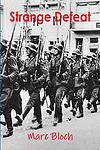Marc Bloch
Marc Bloch was a French historian, medievalist, and a founding member of the Annales School of historiography. He is best known for his works on feudal society and the comparative history of European societies. Bloch was also a member of the French Resistance during World War II and was executed by the Gestapo in 1944.
Books
This list of books are ONLY the books that have been ranked on the lists that are aggregated on this site. This is not a comprehensive list of all books by this author.
-
1. Strange Defeat
"Strange Defeat" is a wartime memoir written by a French historian who served as a soldier during World War II. In the book, the author critically analyzes the reasons behind the swift and shocking fall of France to Germany in 1940. The author attributes the defeat to the outdated strategies and poor leadership of the French military and government, and also highlights the social and political issues that plagued France at the time. The book is not only a personal account but also a profound critique of French society and its institutions.
The 2709th Greatest Book of All Time -
2. The Historian’s Craft
The book in question is a seminal work on the methodology of historical research and writing, exploring the nature, purpose, and challenges of history as a discipline. The author, a renowned historian, delves into the critical analysis of historical evidence, the importance of understanding the past in its own context, and the role of the historian in reconstructing history. He emphasizes the need for rigorous critical thinking and the avoidance of presentism, while also discussing the limitations and potential biases that historians must navigate. The work is both a philosophical reflection on the nature of historical knowledge and a practical guide to the craft of researching and writing history.
The 3285th Greatest Book of All Time -
3. Feudal Society
"Feudal Society" is a comprehensive historical analysis that delves into the social, economic, and political structures of medieval Europe. The book explores the intricate system of feudalism, where society was hierarchically divided between kings, nobles, knights, and serfs, each bound by mutual obligations and duties. Through a detailed examination of legal documents, personal accounts, and other historical sources, the work illuminates how these relationships shaped European society from the ninth to the fifteenth century, influencing everything from land tenure and military service to legal jurisdiction and social norms. The study not only provides insights into the feudal system itself but also reflects on its long-term impacts on European history.
The 5535th Greatest Book of All Time


